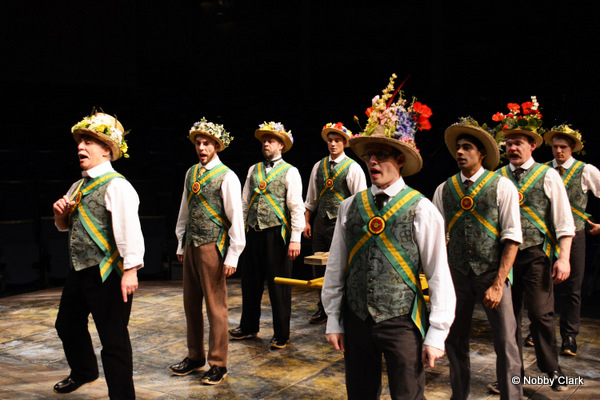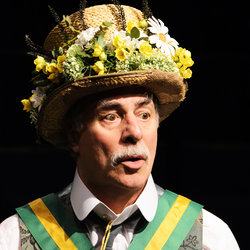An August Bank Holiday Lark (Tour – Watford)

Deborah McAndrew‘s heart-warming northern broadside – on tour for Northern Broadsides and co-produced with the New Vic in Stoke-on-Trent – is a little out of its water in Watford, and Barrie Rutter‘s inclusive, in-the-round production looks awkwardly confined within the Palace’s splendid gilt Edwardian proscenium.
But sheer vitality wins through in what turns out to be a Lancastrian version of The Silver Tassie complete with an injured returning fusilier but without an equivalent of O’Casey’s great scene in a war zone or indeed his incantatory pessimism. We are in Wakes Week on a hill somewhere between the "cottonopolis" and the Pennine moors.
Instead of O’Casey’s bookending social celebrations around the football game and trophy, Rutter’s cast build a rush cart either side of the interval, a sort of mobile haystack – made from a wooden structure, clad with rushes – attended by Morris dancers with flowered hats on their heads and clogs on their feet. These routines, choreographed and set to music by Conrad Nelson are led by Rutter’s gruff old whistle-blowing squire, John Farrar.
Farrar’s daughter Mary (Emily Butterfield) is "walking out" with Frank Armitage (Darren Kuppan) who stealthily joins up, along with Farrar’s two sons (Jack Quarton and Ben Burman), causing a certain amount of social flurry and disruption, as if there wasn’t enough already with upheavals in the textile industry and women wanting the vote.
It’s a nice ironic point that it’s the "lasses" in this show who provide the musical accompaniment while the "lads" do the fighting and the clog-dancing, and a right old clatter they produce, too, so that the storm of syncopated foot-pounding becomes a signal of social cohesion and determination, a really moving piece of community theatre.
McAndrew’s play may not have the poetic pungency of O’Casey or the mythical potency of Jez Butterworth‘s Jerusalem, but it has an ardent trans-Pennine authenticity in the traditions of Alan Plater and Mike Stott, and there’s a cleverly inflected sense of social change and historical foreboding beyond.
The play’s title is a quotation from Philip Larkin’s great poem "MCMXIV", which evokes lines of young volunteers "grinning as if it were all an August Bank Holiday lark… never such innocence again." And so it would prove; the play also becomes something poignant not only about the young men we lost, but the cloudless skies, too. In the last dance, the smiles, and the flowers, have gone.
An August Bank Holiday Lark continues at Watford Palace until 10 May as part of its UK tour. For further dates click here











